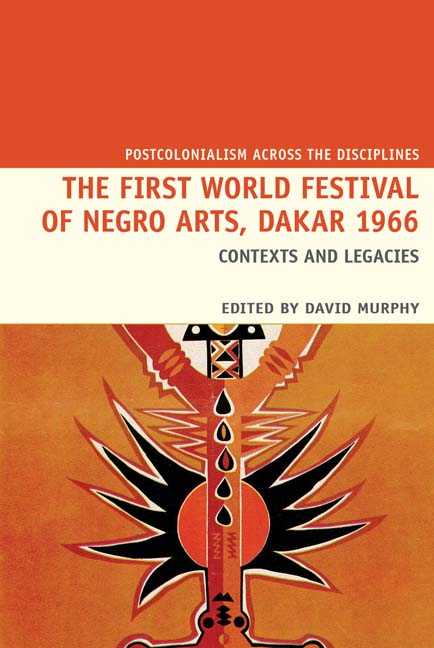Book contents
- Frontmatter
- Contents
- Acknowledgements
- List of Figures
- Notes on Contributors
- Introduction. The Performance of Pan-Africanism: Staging the African Renaissance at the First World Festival of Negro Arts
- I Contexts
- II Legacies
- 6 ‘Negritude is Dead’: Performing the African Revolution at the First Pan-African Cultural Festival (Algiers, 1969)
- 7 Beyond Negritude: Black Cultural Citizenship and the Arab Question in FESTAC ‘77
- 8 Cultural Festivals in Senegal: Archives of Tradition, Mediations of Modernity
- 9 FESMAN at 50: Pan-Africanism, Visual Modernism and the Archive of the Global Contemporary
- 10 PANAFEST: A Festival Complex Revisited
- Books and Films about the 1966 Festival
- Bibliography
- Index
8 - Cultural Festivals in Senegal: Archives of Tradition, Mediations of Modernity
from II - Legacies
- Frontmatter
- Contents
- Acknowledgements
- List of Figures
- Notes on Contributors
- Introduction. The Performance of Pan-Africanism: Staging the African Renaissance at the First World Festival of Negro Arts
- I Contexts
- II Legacies
- 6 ‘Negritude is Dead’: Performing the African Revolution at the First Pan-African Cultural Festival (Algiers, 1969)
- 7 Beyond Negritude: Black Cultural Citizenship and the Arab Question in FESTAC ‘77
- 8 Cultural Festivals in Senegal: Archives of Tradition, Mediations of Modernity
- 9 FESMAN at 50: Pan-Africanism, Visual Modernism and the Archive of the Global Contemporary
- 10 PANAFEST: A Festival Complex Revisited
- Books and Films about the 1966 Festival
- Bibliography
- Index
Summary
Cultural festivals in Senegal draw upon a wide variety of cultural traditions that are staged for an array of local, national and international audiences. Staging masquerades from sacred forests, dances from initiation rites, the skills of sheep-herding, the acrobatics of capoeira and gigs by world music stars, cultural festivals are said to promote peace, development and cultural métissage. The range of rationales proffered for these festivals is as wide-ranging as that of the cultural performances staged at them. Presented as a panacea against the ills of modernity, culture is framed as both source and resource in its staging in festivals, which in fact function as mediations of modernity. While many disciplines recognize the polyvalence of the term ‘culture’, it should be acknowledged that the colonial and postcolonial trajectories of its use in the French imperial nation state and independent Senegal are particularly complex and controversial. Appropriating cultural performances for his politics of Negritude, President Léopold Sédar Senghor turned ‘culture’ into a political instrument. As a result, says Senegalese philosopher Souleymane Bachir Diagne, the very concept of ‘culture’ constitutes a controversial legacy of Senghor's cultural policy (Diagne 2002).
Cultural performances staged at cultural festivals are usually presented as rooted in ‘tradition’, although these performances often owe their format to the spectacles staged at colonial exhibitions (Apter 2005). Senegalese cultural festivals can therefore be seen as repositories of a long history of cultural policy, starting with French colonization. While this well-established origin in colonial relations is usually disavowed, organizers of cultural festivals make uninhibited use of cultural repertoires and deploy them while using a range of modernizing discourses to rationalise their postcolonial iterations. Acknowledging the colonial genealogy of cultural performances, this chapter demonstrates that the independent Senegalese state and its subjects have reclaimed the format of the colonial exhibit for a modernist agenda by deliberately forgetting the colonial origins of its cultural archive. The cultural performances presented at cultural festivals are, in fact, masquerades of modernity (De Jong 2007).
This argument should be situated within a wider debate on the transformation of cultural formats in postcolonial contexts. Cultural performances are increasingly commoditized by ethnic brokers in an attempt to access resources and achieve international recognition (Comaroff and Comaroff 2009; cf. Peutz 2011).
- Type
- Chapter
- Information
- The First World Festival of Negro Arts, Dakar 1966Contexts and legacies, pp. 176 - 189Publisher: Liverpool University PressPrint publication year: 2016



